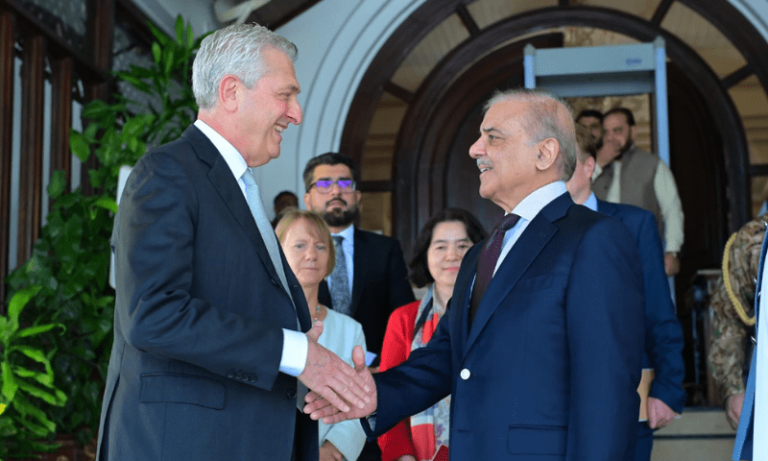Prime Minister Sharif on Tuesday acknowledged the “burden of Afghan refugees” Pakistan is carrying and called on the international community to show “collective responsibility” to address the issue, his office said in a statement.
His remarks were made during a meeting with UN High Commissioner for Refugees Filippo Grandi at the Prime Minister’s Office.
The United Nations High Commissioner for Refugees (UNHCR) arrived in Pakistan on Sunday for a three-day visit, its first since the caretaker government announced plans last November to repatriate what it calls “illegal foreigners.”
“The prime minister stressed that the international community must recognise the burden Pakistan is shouldering in hosting such a large number of refugees and show collective responsibility,” the statement said.
The statement further noted that Prime Minister Shehbaz had pointed out that despite many challenges, Pakistan has hosted Afghan refugees with exemplary respect and dignity.
He sought UNHCR’s support in mobilizing sufficient resources to complement Pakistan’s efforts in this regard and called for UNHCR, the international refugee agency, to play its role in finding durable solutions to address the situation of Afghan refugees, including their safe and dignified return and reintegration into their homeland or resettlement in third countries.
Prime Minister Shehbaz reaffirmed Pakistan’s commitment to addressing the protection and safety needs of people in vulnerable situations and stressed that the international community must take note of the socio-economic challenges and security threats facing Pakistan.
“The UN High Commissioner expressed gratitude to Pakistan for its generosity and hospitality in hosting millions of Afghan refugees over the past decades and assured that UNHCR will continue to work closely with Pakistan to meet the basic needs of Afghan refugees,” the statement added.
Pakistan first began deporting what it called “illegal foreigners” in November last year.
No official data has been released on how many of the estimated 1.7 million undocumented Afghans have returned to their home country since November 2023, but the figure is likely significantly lower than what are now believed to be grossly inflated figures.
However, sources said the total number of illegal Afghans who returned to Afghanistan via Khyber Pakhtunkhwa and Balochistan in the first wave was around 500,000.
UNHCR holds dialogue on refugees
A day earlier, Grandi met Pakistan’s Minister of State for Provincial and Border Affairs (Saffron) Amir Muqam and said the UNHCR plans to hold a global dialogue, probably in October, to discuss refugee-related issues, the ministry said in a statement.
“Pakistan will be specially invited to mark this occasion,” the UNHCR chief said in a statement. He said he hoped the event would create new dimensions and avenues for assistance to refugees around the world.
The meeting was attended by UNHCR Representative in Pakistan, Philippa Candler, and several other UNHCR staff.
“Currently, there are 1.45 million registered Afghan national card holders, but this does not include the large number of Afghan refugees and other nationals who are unregistered,” Federal Minister Muqam said.
He added that the decline in aid for Afghan refugees and development funding to refugee-hosting areas in Pakistan was “worrisome.”
“We need interventions that are exclusive, generous and sustainable,” he said.
Grandi praised the Pakistani people and government for hosting Afghan refugees for over four decades.
Meeting with Foreign Minister Dar
According to a foreign ministry statement, Grandi also met Deputy Prime Minister Ishaq Dar on Monday and appreciated Pakistan’s efforts and contributions in hosting Afghan refugees over the decades.
He briefed Dar, who is also the foreign minister, about UNHCR’s ongoing projects and stressed the importance of continued engagement and cooperation between Pakistan and UNHCR.
Meanwhile, Dar stressed that new humanitarian situations around the world should not distract the world’s attention from the needs of millions of Afghans.
Mr. Dahl also stressed the need for continued demonstrations of international solidarity and adherence to the principles of international responsibility and burden-sharing.

